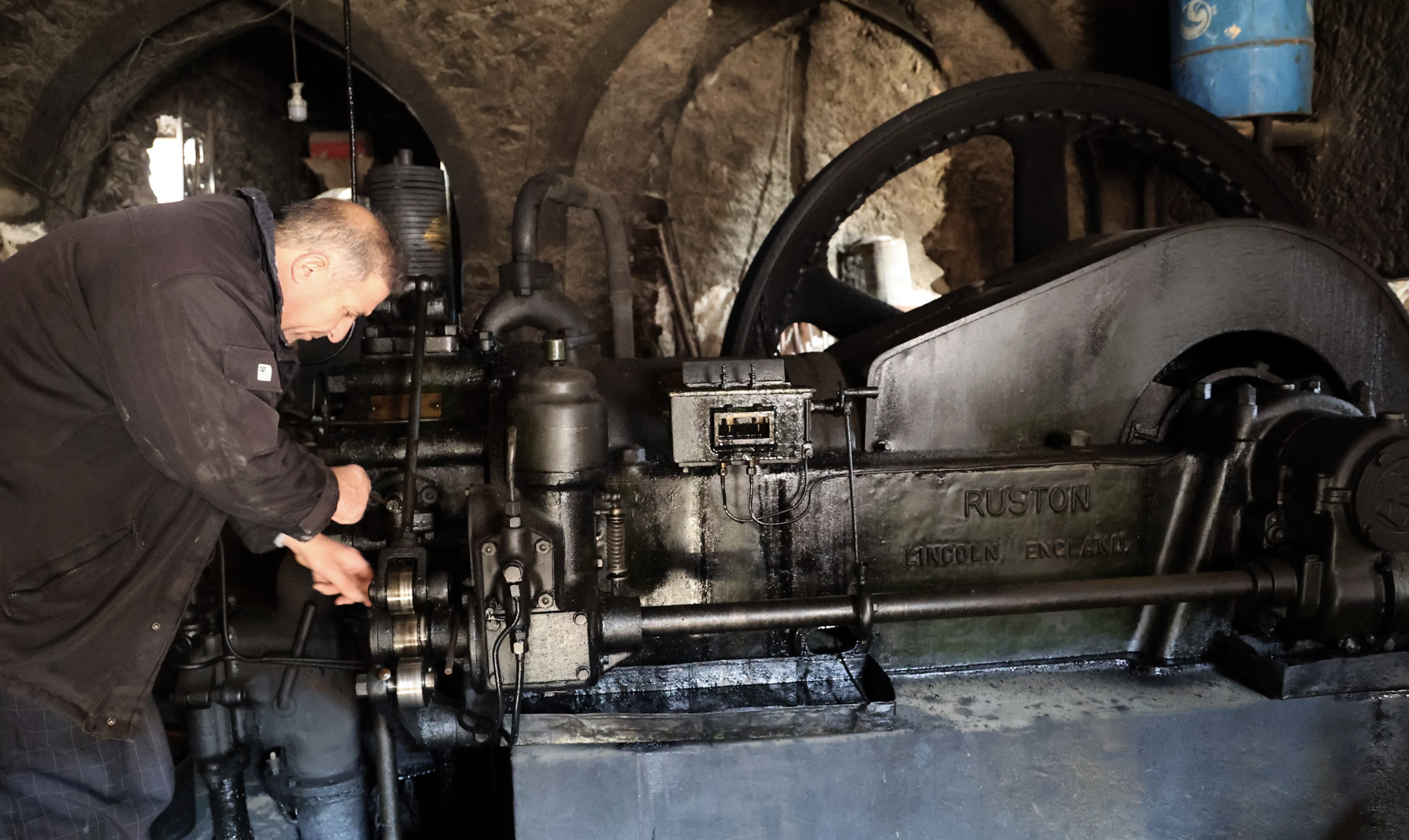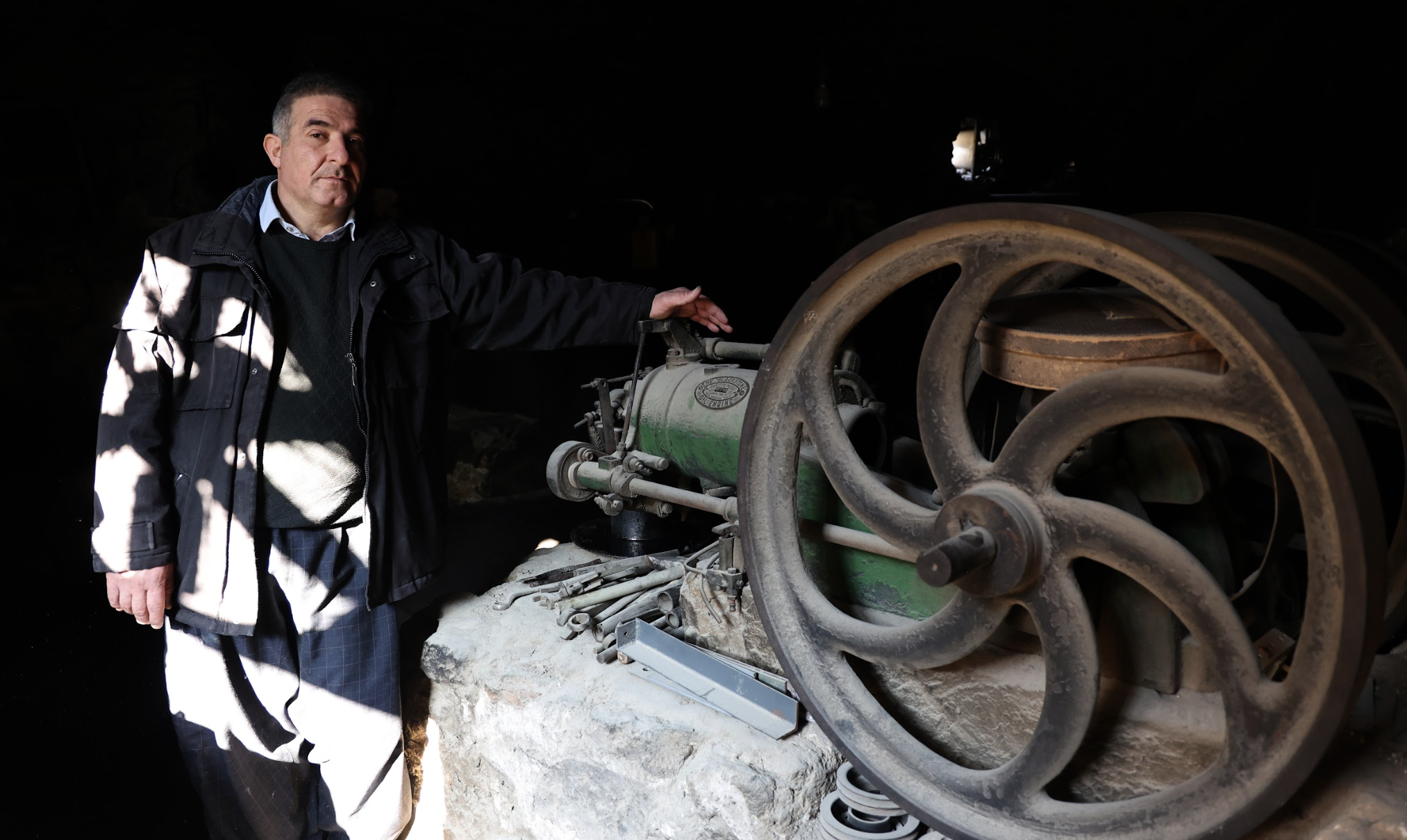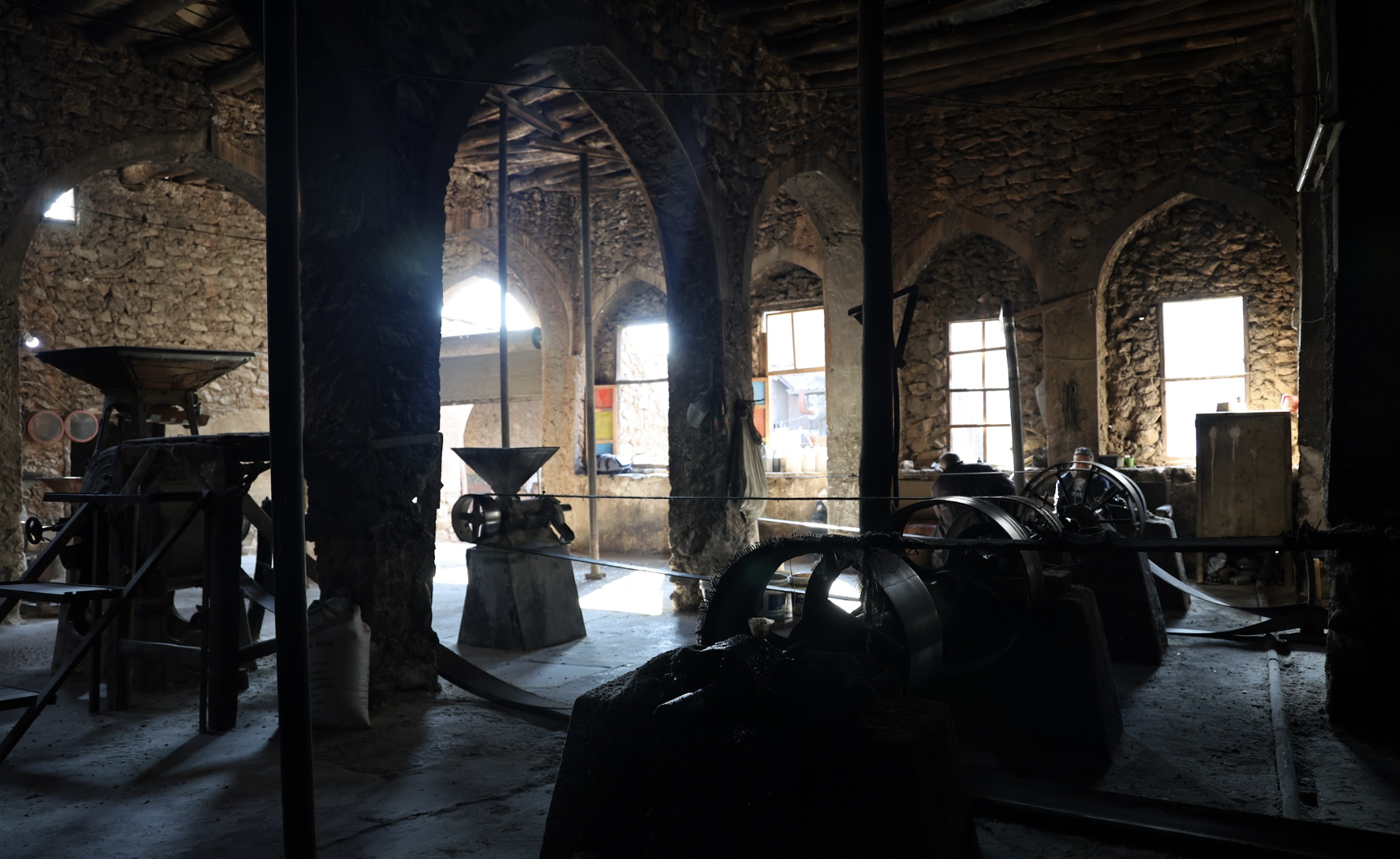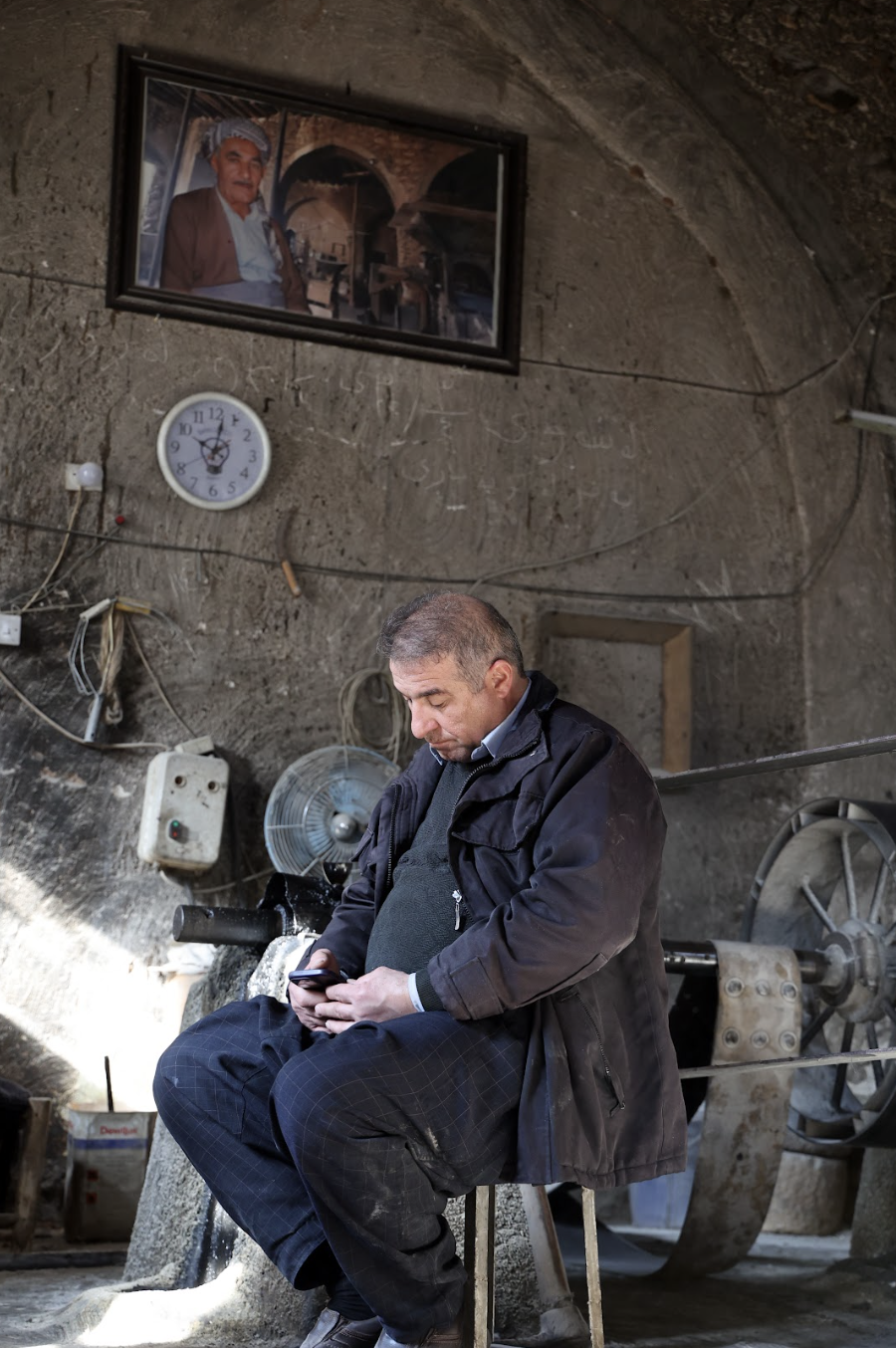In the town of Koy Sanjaq in the Kurdistan Region, tucked behind an old walnut tree that has curved slowly with age, there lies a story not of bricks or machines, but of memory, devotion, and a century-long heartbeat. This is the story of Mam Khidr’s mill, a place that not only grinds wheat into flour, but also serves as a guarantor of life in the hardest times, and a place of refuge on the darkest of days.
At first glance, the mill looks ordinary, consisting of stone walls and an old chimney. When one examines its wooden halls more closely, however, one can begin to feel the pulse of a mechanical heart vowing to make a difference.
Zana Khidr looks after this remarkable place. He moves with the confidence and wisdom of generations. He easily recalls stories even older than the mill.
“I inherited this mill from my father, and he from his father,” Zana begins, voice steady, pride glowing softly. “My grandfather, Haji Kakamin, built it in 1927. Back then, this was empty land. But he had a vision, and the land slowly reshaped itself to fit that dream.”
Before the mill took physical form, engineers and designers from a British company came, mapped the layout, and brought in machines – the core of the operation. These machines were bought for about 1,800 Iraqi dinars, a considerable sum in those days.
However, the construction process was costly in terms of both money and human life, as one engineer died in a tragic accident. “They took his body back with them,” Zana continued his narration of the sad story in a mild tone. “They finished the work, but the memory never left this place.”
Now, 98 years later, the mill is still working and supporting the lives of many people.

The ageless mill
Most machines of this age would have expired, fallen silent, or ended up stored in museums. But Mam Khidr’s mill has defied time, not only surviving, but thriving through the years. Perhaps this was the very reason why the British company returned to try to buy the mill.
“They came three times,” Zana says. “In 2016, 2018, and 2021. A team of 16 people, including the company’s general manager. They offered us £3.8 million to buy the whole mill and take it back to the UK where it came from.”
According to Zana, it was not just a business decision for them. They were fascinated by how the mill had remained functional for so long. They wanted to preserve it, perhaps as a symbol of endurance or to showcase it in a museum.
And yet, every time they came, they left with the same answer: an emphatic “No,” Zana explains. “Even if they offered fifty times more, we wouldn’t sell it. This is our heritage; my grandfather’s hands are in these stones. This place belongs to Koy Sanjaq, to Kurdistan. It’s not for sale.”

Time-tested
The secret to how the mill has survived a century of hard work, war, and change perhaps lies in the skills and experience of the owners. Perhaps they have solved the mysteries of the machine better than the manufacturers themselves.
Zana explains that “we start working at 6:30 am every morning and continue until 1:00 pm. Sometimes, if work is heavy, we go until 4:00 pm. My brother and I acquired it from our father. We know every screw, every sound. If anything breaks, we fix it ourselves.”
More significantly, perhaps the heart of the operation was Mam Khidr himself, Zana’s father. Zana’s eyes soften as he speaks of the man after whom the mill is named. “He started working here at the age of nine and didn’t stop until he passed away at ninety,” Zana relates. “This place was his second skin. He knew every corner like his own hands.”
Khidr was more than a regular worker; he was the soul and spirit of the mill. Zana believes that Khidr’s dedication and attention to detail are what preserved the mill for more than a century. “He treated the machines like they were part of his own body. You can’t replace that kind of love.”

More than grain
Over the years, the mill has processed barley, oats, corn, chickpeas, and animal feed. Customers from all over the Kurdistan Region come here, not just for the flour, but for the story, for the taste of something real. The mill itself has become an attraction, a source of local pride that attracts international visitors as well—a mill defying time and change, a mill like no other.
“We’ve had visitors from Turkiye, Iran, Spain, Germany, and the UK,” Zana shares. “Some are tourists, others are researchers or people curious about the story. They always ask the same thing: ‘Why didn’t you sell it?’ And I always say, because you can’t buy memory. You can’t buy meaning.”

A corner for a friend
During our tour, I notice an unusual corner in the back of the mill, an old bench with a coat hanging above it, untouched by dust. Zana walks over, tenderly brushing a finger over the sleeves. “This belonged to Haman,” he says. “He was a Christian. Worked with us for nearly 70 years. Never missed a single day. One day, right here while working, he passed away. We kept his coat, just like that. It’s our way of remembering him—his loyalty, his spirit.”
To Mam Khidr’s family, the mill is a monument of friendship, memories, and loyalty. As Zana says, it is a small gesture, but it carries the weight of a mountain, an unbreakable bond of friendship, coexistence, and brotherhood that life depends on in this part of the world.

The grain of a family
This mill has not just ground flour or built friendships – it has kept a family together.
“Our family has lived in this place for generations,” Zana says. “It wasn’t just work; it was our life, and it still is. My children, my nephews, all understand its value. And we will keep it running for as long as we can. Not for money, not for fame, but for what it stands for.”
And what it stands for is clear. In an age of fast machines and faster profits, Mam Khidr’s slow mill showcases a soft resistance, defying the rush of modern life and the laws of physics. It is a living reminder that not everything old is outdated, and not everything valuable has a price.
With the golden glint of its stone walls, the mill’s presence and endurance echoes a heartbeat, the heartbeat of Mam Khidr, who gave his time and mind to it. It is not just the rhythmic movement of the wheels, or the soft click of tools; rather, it is a spirit guiding the mill’s durability and resistance. It is something deeper. A presence. A soul.
Mam Khidr’s mill is not just a place that makes flour. It is a place that keeps memory alive. It grinds not just grain, but time, slowly, patiently, faithfully. A monument to love, labor, and the quiet power of togetherness. To Mam Khidr’s family, a place is more than property. It is home. And no matter how much is offered, they remind us all that home is not for sale, memories are irreplaceable, love cannot be exchanged, and a legacy cannot be forgotten.
Mohammad Dargalayi is a journalist and photographer with 14 years of experience. He is a member of IFJ Global.

